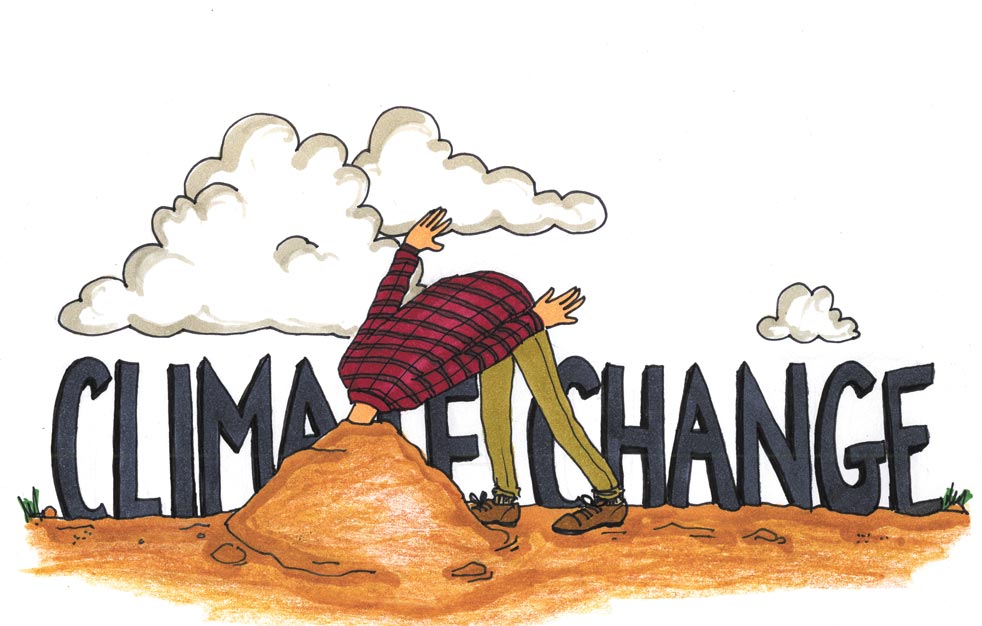
Government must take action on climate change
September 25, 2014 —
This June, July and August were the hottest months on record, and 2014 is set to become the hottest year in recorded history. The United Nations Sept. 23 climate summit in New York couldn’t have come at a better time. A global problem requires a global solution, but there needs to be a shift in public opinion before we’ll see any substantial change from climate summits.
Approximately 310,000 people marched on the streets of New York City Sept. 21 in preparation for the UN Climate Summit. Another 260,000 gathered in cities around the world.
Calgary saw a scant crowd of 250 people attend Sunday’s march. Environmentalism has never found a home in Canada’s petrol-province.
American President Barack Obama and British Prime Minister David Cameron attended the summit, but Prime Minister Stephen Harper skipped both the summit and the march.
The states with the power to combat the effects of climate change are the same ones who cave in to corporate interests at the expense of the planet. Sure, we all think our own country is special. But Canada is a country that actually has the power to do something and we’re actively impeding progress by muzzling scientists and refusing to ratify the Kyoto Protocol.
U.S. secretary of state John Kerry commented on climate change in response to Sunday’s climate march, comparing the crisis to threats posed by ISIS and Africa’s Ebola outbreak.
Kerry acknowledged that “the grave threat of climate should take a prominent place” on the list of issues we face today. He’s right, but climate change has always been a back-burner issue for politicians. We’re the frogs slowly boiling in the planetary pot they check on once or twice a year.
Our leaders make us feel like they’re doing something when they get together and use words like sustainability. It might make a nice photo op, but we need binding agreements. We’re not doing enough to curb emissions and we’ve ignored warning after warning from the global scientific community.
The main goal of the summit is to expand carbon pricing systems. Governments set caps on the amount of carbon companies can emit. If their emissions are higher than the cap, they’re fined. If emissions are under the cap, businesses can sell their remaining carbon emissions for profit. While it’s better than nothing, the system puts a bandage on a problem that needs open-heart surgery.
Policy makers need to go beyond carbon pricing systems. Require utilities companies to generate more electricity from renewable sources, halt the building of new refineries and pipelines and increase funding for research into viable alternative energy sources.
A draft of the latest report from the Intergovernmental Panel on Climate Change reads, “continued emission of greenhouse gases will cause further warming and long-lasting changes in all components of the climate system, increasing the likelihood of severe, pervasive and irreversible impacts for people and ecosystems.”
We’re past the point of sober analysis and into the plot of an apocalyptic movie. Climate change is not a leftist conspiracy, it’s a pragmatic concern.
Warsaw hosted the annual climate change summit in 2013 and six major NGOs walked out of the conference. They issued a joint statement that said “[the conference], which should have been an important step in the just transition to a sustainable future, is on track to deliver virtually nothing.”
We shouldn’t be surprised at the result of the Warsaw talks. Corporations who benefit from stagnant climate policy influence states’ agenda and underdeveloped countries most affected by climate change often have little influence.
These summits are necessary, but they have to start passing binding accords to make an impact. We don’t have time for another ineffectual conference. We can’t wait until issues reach an existential level before engaging in them. The time to act is before climate change brings about widespread human suffering.
We might be past that point. We know there’s a problem, but a combination of apathy and corporate money has kept us too numb to act. The climate’s doomsday clock sits a few close strokes to midnight. The world has seen it’s share of close calls, but this one is irreversible.
Don’t be surprised when this summit doesn’t save the world. Governments and corporations need consistent public pressure before they’ll start to change. Substantial policy decisions don’t happen overnight. Constantly pressuring our political leaders is doing something, even if it’s slow going. If we want our government to take climate change seriously, we have to make them.
Chris Adams, Gauntlet Editorial Board
